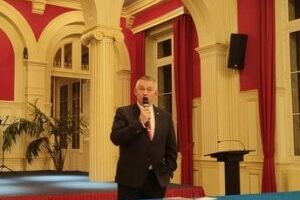Colloque en Pologne « Phénomène de Nomadisme »
 Intervention de Clyde Vachez, étudiant du Master Géopolitique sur l”Affirmation identitaire et résurgence d’un sentiment d’appartenance palestinien : les conséquences de la ségrégation socio-spatiale des populations bédouines du Néguev”
Intervention de Clyde Vachez, étudiant du Master Géopolitique sur l”Affirmation identitaire et résurgence d’un sentiment d’appartenance palestinien : les conséquences de la ségrégation socio-spatiale des populations bédouines du Néguev”
Poussées à la sédentarisation depuis 1948, les populations bédouines se sentent discriminées par l’État d’Israël. 200 000 bédouins peuplent actuellement le désert du Néguev.
Une moitié d’entre-deux habite des « Townships » ou villes planifiées par l’État d’Israël. L’autre moitié s’organise et peuple des villages non reconnus par l’État aux conditions de vie précaires sans infrastructures ni services. L’inefficacité des pouvoirs publics et la démolition des habitations illégales bédouines par les autorités laisse planer l’existence d’une ségrégation socio-spatiale dans le pays. Entre paradigme colonial, sionisme politique et plan d’urbanisation, ces citoyens d’Israël ne se reconnaissent plus dans le projet politique du pays.
À l’heure où « le système démocratique recule dans le monde », une partie des Bédouins remettent en cause la légitimité de l’Etat d’Israël à les administrer. On assiste ainsi à un retour aux valeurs identitaires, religieuses et nationalistes. C’est le nécessaire désir d’une réaffirmation culturelle et historique de ces « invisibles », de ces déplacés. Dans ce contexte, il serait judicieux de se questionner sur l’avenir sécuritaire d’une telle démocratie. « La question n’est plus de savoir si la situation va exploser, mais quand va-t-elle exploser ? »
“Identity affirmation and resurgent feeling of belonging to Palestine: Consequences of socio
spatial segregation of Bedouin populations in the Negev”
Pushed to be sedentary since 1948, the Bedouin populations feel discriminated by the State of Israel. 200,000 Bedouins currently populate the Negev desert. Half of which live in townships or planned cities by the State of Israel. The other half has organized themselves in villages living in poverty, without infrastructure or services, and not recognized by the State.
The inability of public powers along with the demolition of illegal Bedouin habitations by the authorities, leaves the existence of a sociospatial segregation in the country. Between the colonial paradigm, Zionist politics and urban planning, the citizens of Israel no longer recognize themselves in the political project of the country.
At the hour where “the democratic systems going backwards in the world”, a part of Bedouins are reconsidering the legitimacy of the state of Israel to its administrators. As a result, we are witnessing a return to the values of identity, religion, and nation. It is the necessary desire of a cultural and historical reaffirmation of these “invisibles” and displaced. Within this context, it would be wise to question ourselves regarding the security for the future of such a democracy. “The will no longer be whether the situation will explode, but rather when will it explode ?



